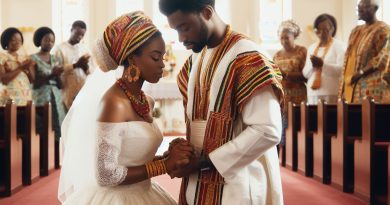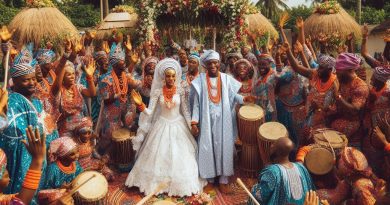Decoding Marriage: Messages from Nigerian Films and Music
Last Updated on October 24, 2023
Introduction
This blog post aims to explore the messages about marriage that can be found in Nigerian films and music.
Marriage plays a significant role in Nigerian society, being highly valued and culturally important.
These mediums often reflect the societal norms, expectations, and challenges associated with marriage in Nigeria.
By decoding these messages, we can gain a deeper understanding of the complex dynamics surrounding marriage in Nigerian culture.
Marriage in Nigerian Films
A. Overview of the Nigerian film industry (Nollywood)
Nollywood is the second-largest film industry in the world in terms of annual film production.
Nollywood films are known for their vibrant storytelling, melodrama, and reflection of Nigerian society.
Nigerian films explore various themes, including romance, family dynamics, and societal issues.
B. Popular Nigerian films that depict different aspects of marriage
- “The Wedding Party” – This romantic comedy showcases the grandeur and challenges of a Nigerian wedding.
- “Jenifa” series – These films follow the life of a young woman navigating marriage, career, and societal expectations.
- “30 Days in Atlanta” – This comedy highlights cultural differences in marriage through a misadventure-filled story.
- “Phone Swap” – A chance encounter leads to an accidental marriage, exploring the complexities of relationships.
- “Figurine” – This supernatural thriller delves into the consequences of a cursed artifact on a couple’s marriage.
- “Aunty” series – These films explore the influence of extended family members on marital relationships.
C. Traditional cultural practices and values related to marriage portrayed in films
Nigerian films often portray traditional cultural practices and values surrounding marriage. Some examples include:
- Bride price: Films depict the negotiation process between the groom and bride’s family, emphasizing its significance.
- Traditional wedding ceremonies: Elaborate traditional ceremonies and rituals are showcased, highlighting cultural heritage.
- Polygamy: Nigerian films explore the complexities and challenges of polygamous marriages within the cultural context.
- Extended family involvement: Films often depict the active involvement and influence of extended family members in marital decisions.
- Gender roles: Traditional gender roles are portrayed, showing the expectations placed on men and women within marriages.
- Divorce: Films demonstrate the societal stigma associated with divorce and the potential consequences for individuals.
- Marital bliss: Some films portray idealized versions of marriages that focus on love, respect, and commitment.
- Love versus arranged marriages: Nigerian films often depict the clash between traditional arranged marriages and modern love-based relationships.
In fact, Nigerian films offer a rich portrayal of marriage, showcasing a wide range of themes and cultural practices.
These films provide insights into the complexities, challenges, and joys of matrimonial relationships within Nigerian society.
By exploring traditional practices and values, Nollywood films promote cultural understanding and initiate conversations around marriage and its significance.
Themes and Messages in Nigerian Film
A. Common themes related to marriage in Nigerian films
- Marriage as a social institution and the importance of family values.
- The pressure to get married and societal expectations placed on individuals.
- Arranged marriages versus love marriages and the conflicts that arise from these differences.
- Infidelity and its consequences on marriages and families.
- The impact of cultural and religious beliefs on marital relationships.
B. Gender roles and expectations in marriage as portrayed in movies
- Traditional gender roles where men are expected to be the breadwinners.
- The portrayal of women as homemakers and their role in maintaining the family.
- The changing dynamics of gender roles in modern Nigerian society and its effect on marriages.
- The exploration of power dynamics and the struggle for gender equality within marriages.
C. The concept of love, commitment, and fidelity in Nigerian films
- The importance of love and emotional connection in a successful marriage.
- The challenges faced in maintaining commitment and fidelity in marriages.
- The influence of external factors like money, fame, and social status on marital relationships.
- The portrayal of love triangles and complicated relationships in exploring the complexities of love.
- The significance of forgiveness, communication, and understanding in sustaining a healthy marriage.
In Nigerian films, marriage serves as a mirror reflecting real-life experiences, unveiling societal complexities and challenges.
These films delve into themes like family values, societal pressures, and the clash between arranged and love marriages, illuminating the ideologies at odds.
Infidelity is another focal point, unraveling its destructive aftermath on families and relationships.
Moreover, culture and religion wield substantial influence over marital dynamics, shaping the choices made within unions.
Nigerian films traditionally depicted men as breadwinners and women as homemakers, but evolving narratives challenge these stereotypes.
Exploring love, commitment, and fidelity, these movies paint a vivid picture of the delicate balance required in successful marriages.
Love stands as the bedrock, yet commitment and fidelity face constant tests from external factors such as money, fame, and social status.
Love triangles and intricate relationships offer a glimpse into the struggles endured by those seeking love.
In short, Nigerian films provide profound insights into the multifaceted nature of marriage in Nigeria, covering societal, cultural, and emotional dimensions.
By analyzing the prevalent themes and evolving gender roles, viewers gain a profound understanding of the intricate challenges that Nigerian marriages face.
Read: Biblical Marriage Messages: Their Relevance in Nigeria Today

Marriage in Nigerian Music
In this section, we will explore the portrayal of marriage and marital issues in Nigerian music, discussing its influence on societal perceptions of marriage and relationships.
A. Overview of the Nigerian Music Industry
The Nigerian music industry is a vibrant and thriving scene that has gained international recognition.
With genres like Afrobeat, Afropop, and Highlife, Nigerian artists have used music as a platform to express various themes, including love, relationships, and marriage.
Popular Nigerian Songs that Address Marriage or Marital Issues
- 1. “African Queen” by 2Baba: This iconic song beautifully portrays a deep love for one’s partner, celebrating the institution of marriage.
- 2. “Olufunmi” by Styl-Plus: This track explores the sweetness and challenges of marriage, emphasizing the importance of commitment and understanding.
- 3. “Joromi” by Sir Victor Uwaifo: This classic Nigerian song highlights the pursuit of love and the desire for a joyful and fulfilling marriage.
- 4. “Love Nwantiti” by CKay: This recent hit reflects on the complexities of relationships and the need for love and patience in marriage.
- 5. “Soke” by Burna Boy: Though not explicitly about marriage, this song addresses societal issues that can affect relationships, shedding light on the challenges couples may face.
B. The Influence of Music on Societal Perceptions of Marriage and Relationships
Music plays a significant role in shaping societal perceptions, including those related to marriage and relationships.
Nigerian songs, with their relatable lyrics and captivating melodies, often offer valuable insights into the dynamics of married life.
Firstly, Nigerian music brings to light the joys and triumphs experienced within marriages.
Through romantic ballads and love songs, artists celebrate the beauty of commitment, emphasizing love, loyalty, and the importance of building a strong foundation for lasting relationships.
Moreover, Nigerian music addresses the challenges faced by couples in marriages.
Songs often delve into issues such as communication breakdown, infidelity, and societal pressures, reflecting the complexities that exist within relationships.
This honest portrayal helps listeners connect with the realities of married life and encourages discussions about these challenges.
Furthermore, music serves as a form of therapy and consolation for those going through marital issues.
By listening to songs that address their concerns, individuals can find solace in knowing that they are not alone in their struggles.
Music can provide a sense of understanding, empathy, and even guidance on how to navigate difficult situations.
However, it is essential to acknowledge that music is not the sole determinant of societal perceptions.
While songs can influence how people perceive marriage, individuals have their own experiences and beliefs that shape their understanding of this institution.
In general, Nigerian music has a profound impact on societal perceptions of marriage and relationships.
Through songs that explore the joys and challenges of married life, music offers valuable insights and prompts conversations on important issues.
It is a powerful medium that connects people and provides solace to those navigating the complexities of marriage.
Read: Matching Bands: Guide to Couple Marriage Rings in Nigeria
Messages Portrayed in Nigerian Music
A. The messages about marriage in Nigerian music
- Nigerian music often portrays marriage as a desirable and important institution.
- Songs highlight the value of commitment and loyalty in a marital relationship.
- Some lyrics emphasize the need for communication and understanding between partners.
- Nigerian music frequently promotes the idea of a lifelong partnership, emphasizing the importance of staying together through thick and thin.
- Songs often celebrate the joys of marriage, such as companionship, love, and family.
B. The portrayal of love, romance, and relationships in song lyrics
- Nigerian music frequently romanticizes love, often depicting it as a powerful emotion.
- Songs often describe the intensity of romantic feelings, such as passion and desire.
- Lyrics often highlight the beauty and attractiveness of love, creating an idealized image of relationships.
- Nigerian music often portrays love as a transformative force, capable of bringing happiness and fulfillment.
- Songs commonly explore the complexities and challenges of relationships, including heartbreak and betrayal.
C. Critical assessment of the impact of music on Nigerian society’s perceptions of marriage
- Nigerian music plays a significant role in shaping societal perceptions of marriage.
- The positive portrayal of marriage in songs reinforces the cultural importance of this institution.
- Lyrics that emphasize the value of commitment may inspire individuals to prioritize and invest in their marriages.
- Romanticized depictions of love in music may raise unrealistic expectations about relationships, leading to disappointment.
- Conversely, songs that address relationship challenges may provide solace and a sense of relatability for individuals facing similar issues.
- The influence of music on society’s perceptions of marriage highlights the power of media in shaping cultural norms and values.
In review, Nigerian music contains various messages about marriage, love, and relationships.
It often portrays marriage as a crucial institution, emphasizing the value of commitment and communication.
The depiction of love and romance in song lyrics tends to be idealized and intense.
Nigerian music plays a significant role in shaping societal perceptions of marriage, both positively and potentially negatively.
Understanding these messages and their impact can provide insights into the cultural significance of music in Nigerian society.
Read: Celebrating Anniversaries: Renewing Your Marriage Message
Comparison to Real-Life Marriages in Nigeria
A. The extent to which Nigerian films and music reflect the reality of marriages in the country
Nigerian films and music often present an idealized version of marriages, portraying them as perfect and flawless.
However, the reality of marriages in Nigeria is far more complex and filled with challenges and problems.
B. Societal expectations versus the complexities of real-life marriages
Societal expectations play a significant role in shaping the perception of marriages in Nigeria.
In contrast, real-life marriages are characterized by complexities that cannot be accurately depicted in films and music.
Nigerian films and music tend to emphasize the importance of love and romance in marriages.
While love is undoubtedly essential in real-life marriages, there are other realities and factors that come into play.
C. The influence of media on individuals’ choices and expectations in marriage
The influence of media, including films and music, on individuals’ choices and expectations in marriage is significant.
Media tends to set unrealistic standards and create false narratives about what a marriage should be.
Many individuals enter into marriages with unrealistic expectations due to the influence of media.
Nigerian films and music often fail to address the challenges and difficulties that arise in real-life marriages.
These unrealistic portrayals can lead to disappointment and dissatisfaction in individuals’ own marriages.
D. The influence of cultural, religious, and societal factors
Real-life marriages in Nigeria are influenced by cultural, religious, and societal factors.
Expectations from extended family members and society can put pressure on couples and contribute to marital issues.
Nigerian films and music rarely delve into the complexities of these external pressures.
The reality is that marriages require a lot of effort, compromise, and communication to be successful.
Real-life marriages involve navigating financial issues, raising children, and managing household responsibilities.
These real challenges are often absent from the romanticized portrayal of marriages in Nigerian films and music.
It is crucial for individuals to have a realistic understanding of marriages beyond what is depicted in the media.
By recognizing the complexities and challenges, couples can better navigate the ups and downs of married life.
Marriage counseling and education can also help couples prepare for the realities of married life in Nigeria.
We should encourage a shift in the portrayal of marriages in Nigerian films and music to reflect real-life experiences.
By presenting a more balanced and nuanced representation, individuals can develop healthier expectations in marriage.
Ultimately, the reflection of real-life marriages in Nigerian films and music is limited and often unrealistic.
It is essential for individuals to look beyond these portrayals and seek a realistic understanding of marriages.
Through open conversations and education, individuals can build stronger and more fulfilling marriages in Nigeria.
Read: Hausa Wedding Traditions: Marriage Messages Explored
Conclusion
Throughout this blog post, we have explored the messages showcased in Nigerian films and music regarding marriage.
These messages provide valuable insights and understandings about marriage in Nigerian society.
Firstly, we discussed how Nigerian films and music often portray marriage as a sacred institution filled with love, passion, and commitment.
These portrayals emphasize the importance of fidelity and the pursuit of a harmonious relationship.
Secondly, we explored the prevalence of themes such as gender roles and societal expectations within Nigerian media.
These themes shed light on the traditional customs and values associated with marriage in Nigerian culture.
Moreover, we highlighted the influence of Nigerian films and music in shaping societal views on marriage.
These forms of media have a significant impact on how marriage is perceived and understood by the general public.
Understanding the messages conveyed in Nigerian films and music regarding marriage holds great significance.
It allows us to gain a deeper insight into the cultural values, relationships, and expectations within Nigerian society.
In closing, the role of media, specifically Nigerian films and music, cannot be overstated when it comes to shaping societal views on marriage in Nigeria.
It serves as a powerful tool that both reflects and influences the beliefs and perspectives surrounding this sacred institution.
By critically analyzing these messages, we can engage in meaningful discussions to promote healthy relationships and challenge societal norms.


